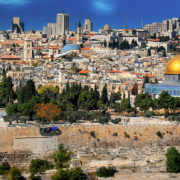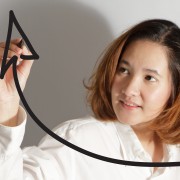YOUR INVESTMENTS: JERUSALEM DAY, CHEESECAKE AND FINANCIAL INDEPENDENCE
As originally appeared in The Jerusalem Post on May 24, 2017.
Here are some tips that will enable you to start making smart financial decisions and get on track toward financial independence
As I write this column, outside of my office there is a steady stream of teenagers singing and waving Israeli flags heading for the annual Jerusalem Day flag parade. While some see this parade as a display of extreme nationalism, I think it’s beautiful. Seeing tens of thousands of our youth celebrating something of substance, in the era of spinners and smartphones, is very moving. Perhaps those that are against the parade are actually a bit jealous at the outpouring of our youth participating together in celebration of the unification of the holiest city in our religion?
As the holiday of Shavuot approaches, we prepare for another expression of unity. Although various cheesecake and blintz recipes get top billing, Shavuot celebrates the Jewish people receiving the Torah. The unification of the Jewish people at Sinai allowed for the receiving of the Torah. “And there Israel camped opposite the mountain” (Exodus 19:1-2). At all their other encampments, the verse says vayachanu (“and they camped,” in the plural); here it says vayichan (“and he camped,” in the singular). For all other encampments were in argument and dissent, whereas here they camped as one human, with one heart (Mechilta, Rashi).
An extension of unity is the concept of each person’s responsibility to take care of each other. This has many ramifications in Jewish law. Rabbi Raphael Katz writes: “The Talmud in Shevuot 39a explains the verse “And a man will stumble because of his brother’s iniquity. This teaches “shekol yisrael areivim zeh bazeh” – that all Jews are guarantors for one another. This principle is called “arvut.”
In Talmud Rosh Hashana 29a we find (according to Ritva and others) the “positive” formulation of the concept of arvut. There the Talmud states that one who has already fulfilled his obligation can nevertheless cause others, who have yet to discharge their obligation, to fulfill the mitzva.
For example, one who has already fulfilled the mitzva of kiddush on Shabbat can repeat the kiddush on behalf of someone else who has not yet recited it, and the repetition is not considered as having mentioned Hashem’s name unnecessarily. This Halacha is based on the above concept that every Jew is a “guarantor” for his fellow Jew’s observance.”
I want to take this concept of being a guarantor for each other and apply it to finance. Sadly, I see individuals make financial mistake after mistake, and the result is financial hardship. Here are some tips that will enable you to start making smart financial decisions and get on track toward financial independence:
- Budget: Take control of your spending. Track income and expenses, and then you can start a realistic savings plan and start building wealth.
- Get out of debt: Credit-card debt or overdraft is the No. 1 obstacle to getting ahead financially. It’s a lot better to take those interest payments and plow them into savings than to keep paying the credit-card company.
- Emergency fund: You may need dental work, have a flat tire or be out of work. By creating an emergency fund, you will be able to handle surprise expenses. Keep three to four months of income in a short-term deposit or something similar to have it liquid and available at a moment’s notice in case you need to draw upon it.
- Invest: There is no shortcut to building wealth. You need to start investing, and with discipline, the wonders of compound interest and the growth of the stock and/or real-estate market, over time you will create a comfortable nest egg.
- Maximize your retirement-account contributions: There is no better investment than a tax-deferred investment. If living in Israel, make sure you are maximizing contributions to your keren hishtalmut and kupot gemmel. Keep the money invested, and you will be surprised at the long-term growth of those accounts.
Rabbi Katz continues: “On the eve of Yom Yerushalayim, it is appropriate to recall, that Yerushalayim has the power to evoke this awareness of the essential unity and intermingling of Am Yisrael’s soul. In the words of our Psalmist, King David: ‘Jerusalem built up is like a city joined together’ (Psalms 122; 3), and our sages commented, ‘It is a city that joins all of Israel into friends and colleagues.’”
Chag sameach.







